
Kenya Installs The First Solar Power Plant That Transforms Ocean Water Into Drinking Water
While most of us, who also have the privilege of using the Internet on a daily basis and therefore are able to read this, don’t have any problems getting fresh drinking water, that’s not the case for everyone. Around 2.2 billion people struggle because they don’t have safe access to drinking water which could seem pretty ironic considering we live on a planet that is 2/3 water. But no need for those long faces as there might be a solution to this problem. Recently, the NGO Give Power installed a solar-powered plant that transforms salty ocean water into fresh drinking water and thus helps 25,000 people a day! More info: Give Power
The NGO, Give Power, conducted their first solar-powered water transforming plant test early in August this year
Image credits: GivePower
Even though this is not their first similar project, Give Power recently had huge success in installing a new plant that transforms saline water into drinking water in Kiunga, a small town in Kenya and even had its pilot test in August which has already improved the lives of residents of the town. The organization doesn’t plan to stop there and wants to use the technology in other parts of the world.
The two water pumps of the plant were able to provide drinking water for 25,000 people
Image credits: GivePower
Even though it’s commonly thought that 1/3 of people don’t have access to drinking water, the problem is much bigger in some regions, especially in sub-Saharan Africa. Therefore, the Kenyan town of Kiunga was chosen for the installment of this plant specifically to tackle this problem and help as many people as possible. After this success, the organization is already planning similar projects in Colombia and Haiti.
They actually have the capacity to provide even more and supply 35,000 people with drinking water 24 hours a day
Image credits: GivePower
The desalination process that’s crucial in turning salt water into drinking water is very power-consuming and therefore expensive. Therefore, using solar energy might be a very good long-term solution. Give Power installed what they call “a solar water farm” in Kiunga that harvests solar energy using solar panels. They are able to produce 50 kilowatts of energy and power 2 water pumps 24 hours a day.
This is life changing for regions such as Kenya, where more than 1/3 of the people don’t have access to safe drinking water
Image credits: GivePower
Before the installment of this technology, people sometimes had to travel for more than an hour just to get some drinking water for themselves and their families. Since every drop of fresh water was so precious, they would usually bathe and wash their clothes in dirty salt water which is very harsh on the skin.
And have to travel for more than an hour to get drinking water for their families
Image credits: GivePower
Hayes Barnard, president of GivePower, said, “You see children inside of these villages, and they’ve got these scars on their stomachs or their knees because they got so much salt in their wounds. They were basically poisoning their families with this water.” But the installment of the plant did not only help them with that but also saved them from various diseases, since the water they earlier commonly used was often full of pollutants and various parasites. What a huge step for humanity!
People were really glad to hear about this news
81Kviews
Share on FacebookWell Kenya tested a much smaller version of this back in January 2018 (200 gallon a day test machine), this is the first large scale there. I mean desalination is not exactly new and three Israeli companies are at the forefront of this. The world largest such plant is in San Diego and hundreds more being built around the world. In fact this one is mostly Israeli tech acquired through the Israeli-Kenya Partnership Agreement. Already over 300 million people world wide get some of their water from desalination and it is only increasing. It has its shortfalls because of the disposal of the heavy brine, as it takes 10 gallons of salt water to make 1 gallon of drinking water and then you need to dispose of the heavy salt brine remains. As long as like San Diego you can do that, then it is practical
Didn't South Africa refuse Israel's offer of desalinisation, during a water crisis because they don't like Israel?
Load More Replies...its usually sent back to the ocean as a salt brine, as long as there are no reefs or delicate ecosystems, it is fine. Remember desalination takes 10 gallons of sea water to make 1 gallon of drinking, the rest is a heavy brine put back to the sea
Load More Replies...Water shortages threaten people across the globe. This is something that politicians everywhere need to address and we need to get behind!
Well Kenya tested a much smaller version of this back in January 2018 (200 gallon a day test machine), this is the first large scale there. I mean desalination is not exactly new and three Israeli companies are at the forefront of this. The world largest such plant is in San Diego and hundreds more being built around the world. In fact this one is mostly Israeli tech acquired through the Israeli-Kenya Partnership Agreement. Already over 300 million people world wide get some of their water from desalination and it is only increasing. It has its shortfalls because of the disposal of the heavy brine, as it takes 10 gallons of salt water to make 1 gallon of drinking water and then you need to dispose of the heavy salt brine remains. As long as like San Diego you can do that, then it is practical
Didn't South Africa refuse Israel's offer of desalinisation, during a water crisis because they don't like Israel?
Load More Replies...its usually sent back to the ocean as a salt brine, as long as there are no reefs or delicate ecosystems, it is fine. Remember desalination takes 10 gallons of sea water to make 1 gallon of drinking, the rest is a heavy brine put back to the sea
Load More Replies...Water shortages threaten people across the globe. This is something that politicians everywhere need to address and we need to get behind!
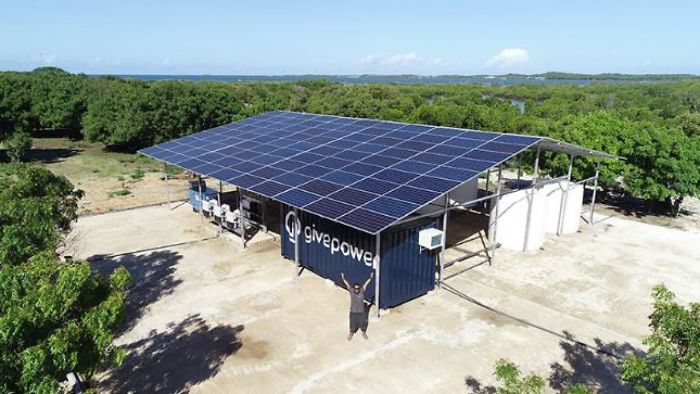
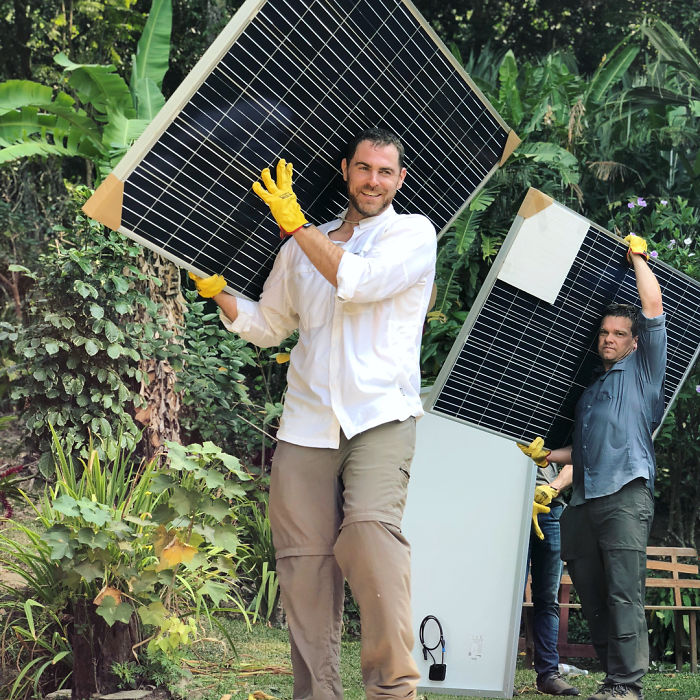
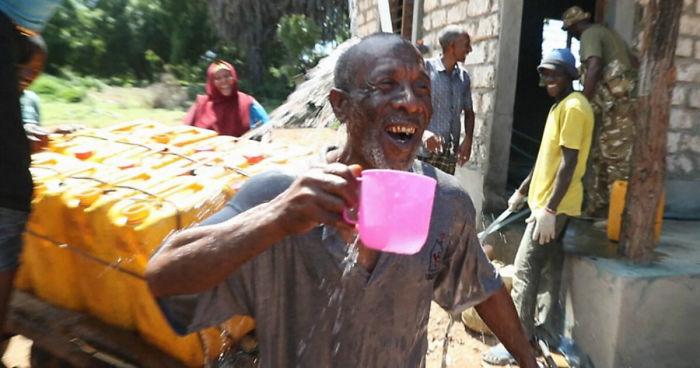
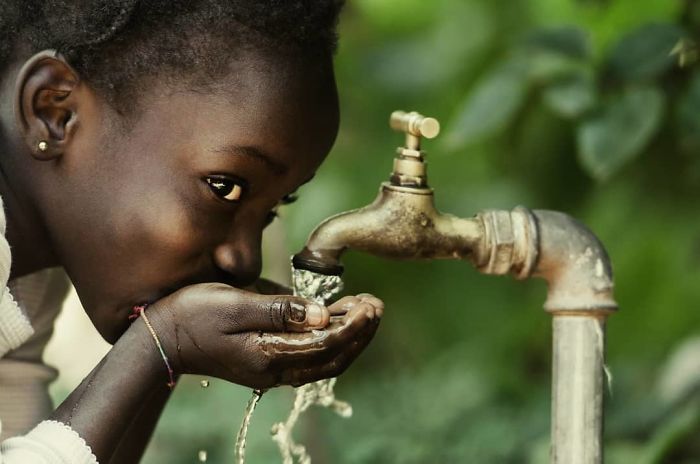
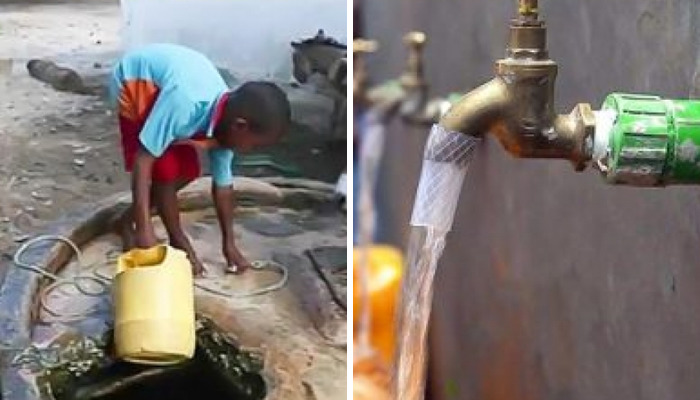
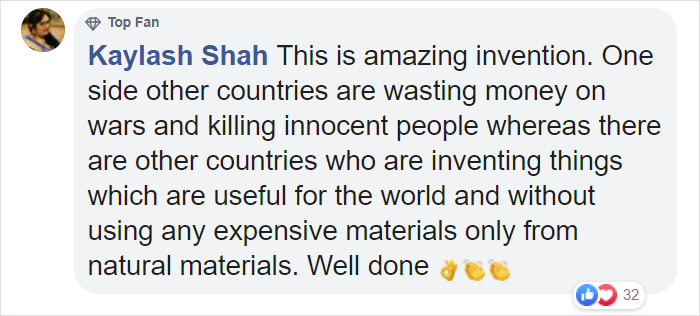
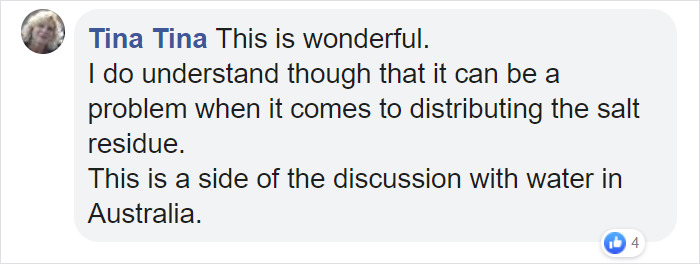















308
23